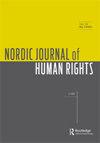The Future is Now: Climate Cases Before the ECtHR
IF 1.2
Q3 POLITICAL SCIENCE
引用次数: 7
Abstract
ABSTRACT This article evaluates the potential role of the European Court of Human Rights in adjudicating cases related to climate change. The Court is currently facing its first four climate applications, and addressing them is more than a routine process of applying existing case law. These cases speak to fundamental questions regarding the Court’s engagement with systemic problems, politically and technically challenging issues, and its own subsidiarity to state decision-making. Looking at recent environmental case law, this article identifies and discusses various possible futures for the Court’s approach to climate cases, including from admissibility, substantive, and remedial perspectives. It also considers the tendencies and factors influencing the Court’s potential response to climate claims. This includes its docket crisis, its evolution towards a ‘procedural turn’, and its approach to the balancing of competing interests and its selection of the appropriate level of scrutiny. We conclude that the Court must contribute to the search for a modus vivendi that permits competing interests to coexist and ensures a liveable future. This is not only a question of ensuring future enjoyment of human rights, but also of safeguarding the Court’s own ability to carry out its role and to thrive into the future.未来就是现在:欧洲人权法院审理的气候案件
本文评估了欧洲人权法院在裁决与气候变化有关的案件中的潜在作用。最高法院目前正面临其首批四项气候申请,处理这些申请不仅仅是适用现有判例法的例行程序。这些案件涉及到一些基本问题,包括最高法院如何处理系统性问题、政治和技术上具有挑战性的问题,以及最高法院对国家决策的辅助作用。回顾最近的环境判例法,本文确定并讨论了法院处理气候案件的各种可能的未来,包括从可采性、实质性和补救角度。它还考虑了影响法院对气候索赔的潜在反应的趋势和因素。这包括它的摘要危机,它向“程序转向”的演变,以及它平衡竞争利益的方法和选择适当的审查水平。我们的结论是,法院必须为寻求一种允许相互竞争的利益共存并确保一个宜居的未来的权宜之计作出贡献。这不仅是一个确保今后享有人权的问题,而且也是一个保障法院本身履行其作用和在未来蓬勃发展的能力的问题。
本文章由计算机程序翻译,如有差异,请以英文原文为准。
求助全文
约1分钟内获得全文
求助全文
来源期刊

Nordic Journal of Human Rights
POLITICAL SCIENCE-
CiteScore
1.00
自引率
25.00%
发文量
29
期刊介绍:
The Nordic Journal of Human Rights is the Nordic countries’ leading forum for analyses, debate and information about human rights. The Journal’s aim is to provide a cutting-edge forum for international academic critique and analysis in the field of human rights. The Journal takes a broad view of human rights, and wishes to publish high quality and cross-disciplinary analyses and comments on the past, current and future status of human rights for profound collective reflection. It was first issued in 1982 and is published by the Norwegian Centre for Human Rights at the University of Oslo in collaboration with Nordic research centres for human rights.
 求助内容:
求助内容: 应助结果提醒方式:
应助结果提醒方式:


